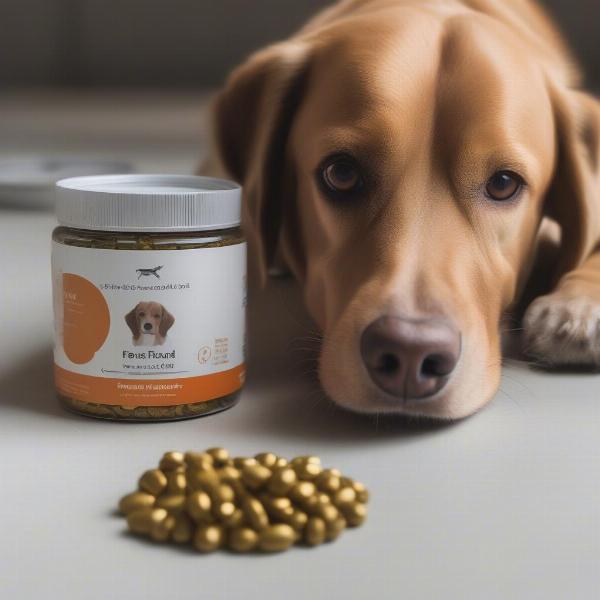Dry skin in dogs, also known as xerosis, is a common issue that can range from a mild annoyance to a more serious problem. It can cause itching, flaking, and discomfort for your furry friend. Understanding the underlying causes of dry skin is crucial for effective treatment and prevention. This article explores the various factors that can contribute to canine dry skin, helping you identify the potential culprits and take appropriate action to keep your dog’s coat healthy and comfortable.
Environmental Factors Contributing to Dry Skin
Just like humans, dogs can be affected by environmental factors that lead to dry skin. Low humidity, especially during winter months with indoor heating, can strip moisture from their skin. Similarly, excessive bathing with harsh shampoos can disrupt the natural oils that protect the skin, leading to dryness and irritation. Allergens in the environment, such as pollen, dust mites, and mold, can also trigger allergic reactions that manifest as dry, itchy skin.
Identifying and Minimizing Environmental Triggers
If you suspect environmental factors are causing your dog’s dry skin, consider using a humidifier to increase indoor humidity. Opt for hypoallergenic shampoos formulated for sensitive skin and avoid over-bathing. Regular grooming can help remove allergens and distribute natural oils, keeping the coat healthy. Protecting your dog from extreme weather conditions can also prevent dry skin.
Nutritional Deficiencies and Dry Skin
 Dog food for healthy skin
Dog food for healthy skin
A balanced diet plays a vital role in maintaining healthy skin. Nutritional deficiencies, particularly a lack of essential fatty acids like omega-3 and omega-6, can contribute to dry skin and a dull coat. These fatty acids are crucial for skin health and maintaining the skin’s barrier function.
Addressing Nutritional Needs
Ensure your dog’s diet is complete and balanced, providing all the necessary nutrients, including essential fatty acids. You can supplement their diet with fish oil or flaxseed oil, after consulting with your veterinarian, to boost omega-3 intake. A high-quality diet rich in protein and other essential vitamins and minerals can also contribute to overall skin health.
Underlying Medical Conditions and Dry Skin
Sometimes, dry skin can be a symptom of an underlying medical condition. Parasites, such as fleas and mites, can cause intense itching and dry skin due to allergic reactions to their saliva. Bacterial or fungal infections can also lead to dry, flaky skin, often accompanied by redness and inflammation. Hypothyroidism, a condition where the thyroid gland doesn’t produce enough hormones, can also manifest as dry skin and a dull coat. Allergies, whether to food or environmental allergens, can trigger skin inflammation and dryness.
Seeking Veterinary Care
If your dog’s dry skin persists despite addressing environmental and nutritional factors, it’s essential to consult with a veterinarian. They can diagnose any underlying medical conditions and recommend appropriate treatment. This may involve medications for parasites, antibiotics for bacterial infections, antifungal medications for fungal infections, or hormone replacement therapy for hypothyroidism. Allergy testing can help identify specific allergens, enabling you to manage your dog’s environment or diet accordingly.
Conclusion
Dry skin in dogs can have various causes, ranging from environmental factors and nutritional deficiencies to underlying medical conditions. By understanding these potential causes, you can take proactive steps to prevent and treat dry skin, ensuring your canine companion enjoys a healthy, comfortable coat. Remember, if your dog’s dry skin persists or worsens, consulting with a veterinarian is crucial for accurate diagnosis and effective treatment.
FAQ
-
How often should I bathe my dog with dry skin? Bathing too frequently can strip the skin of its natural oils. For dogs with dry skin, bathing every 4-8 weeks, or as recommended by your veterinarian, is usually sufficient.
-
What are some signs of a skin infection in dogs? Signs of a skin infection can include redness, inflammation, excessive itching, hair loss, pus-filled sores, and a foul odor.
-
Can I use human moisturizer on my dog? It’s generally not recommended to use human moisturizers on dogs, as some ingredients can be toxic to them. Consult with your veterinarian for safe and effective moisturizing options for dogs.
-
Are certain dog breeds more prone to dry skin? Yes, some breeds, such as Bulldogs, French Bulldogs, and Shar-Peis, are more prone to skin issues, including dry skin.
-
Can stress cause dry skin in dogs? While stress isn’t a direct cause of dry skin, it can weaken the immune system, making dogs more susceptible to skin infections and other conditions that can lead to dry skin.
Related Articles on ILM Dog
ILM Dog is your trusted resource for all things dog-related. We offer expert advice on dog breeds, health and medical care, training and behavior, nutrition, grooming, and much more. Our aim is to provide practical, reliable information to help dog owners worldwide provide the best possible care for their furry companions. Whether you’re a seasoned dog owner or just starting your journey, ILM Dog is here to support you. For expert advice tailored to your dog’s needs, contact us at [email protected] or +44 20-3965-8624.